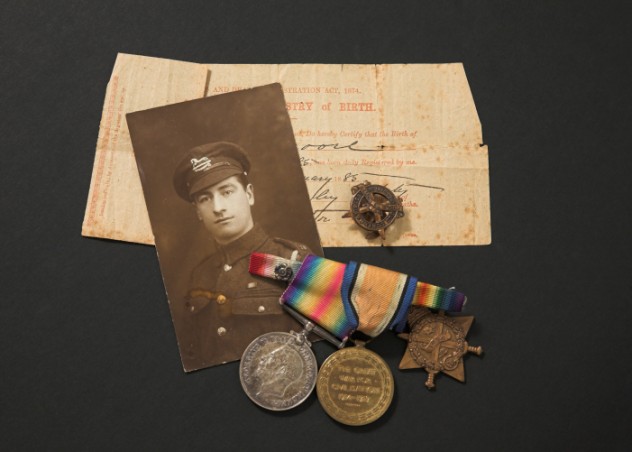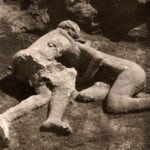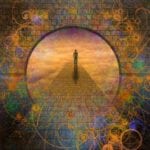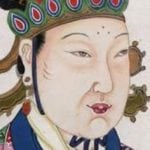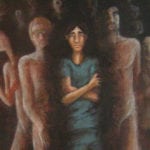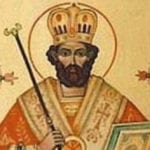10 Edward Austrian
Patricia Austrian’s four-year-old son Edward had a phobia of drizzly, grey days. Then he developed a problem with his throat and started to complain of severe pain. Whenever he had a sore throat, he said that his “shot was hurting.” Edward told his mother very detailed stories about his previous life in the trenches in what was apparently World War I. He told her that he had been shot in the throat and killed. At first doctors could not find a cause for his sore throat and removed his tonsils as a precautionary measure. A cyst developed in his throat and doctors did not know how to treat it. As soon as Edward was prompted to tell his parents and others more about his previous life and talk about how he was killed, the cyst disappeared. Edward’s doctors never found out why the cyst had vanished.
9 The Dutch Clock
Bruce Whittier had reoccurring dreams of being a Jewish man hiding in a house with his family. His name had been Stefan Horowitz, a Dutch Jew who was discovered in his hiding place along with his family and taken to Auschwitz, where he died. During and after the dreams, he felt panicked and restless. He began to record his dreams, and one night he dreamed about a clock, which he was able to draw in great detail upon waking. Whittier dreamed about the location of the clock in an antiques shop and went to look. The clock was visible in the shop window and looked exactly like the one in his dreams. Whittier asked the dealer where it had come from. It transpired that the dealer had bought the clock from among the property of a retired German major in The Netherlands. This convinced Whittier that he really had led a past life.
8 John Raphael And The Tower Tree
Peter Hume, a bingo caller from Birmingham, England, started having a very specific dreams about life on guard duty at the Scottish border in 1646. He was a foot soldier of Cromwell’s army and his name was John Raphael. When put under hypnosis, Hume remembered more details and locations. He started to visit places he remembered with his brother and even found small items that appeared to have come from the era in which he had lived, such as horse spurs. With the help of a village historian in Culmstock, South England, he even managed to positively identify details about a church that he had known—he was able to tell her that the church used to have a tower with a yew tree growing from it. This was not a published fact, and it startled her that Hume knew it—the church tower had been taken down in 1676. In local registers, John Raphael was discovered to have been married in the church. A civil war historian, Ronald Hutton, investigated the case and asked Hume very era-specific questions while under hypnosis. Hutton was not satisfied that Hume was totally in tune with the era of his past life, as he could not answer all his questions in a satisfactory way.
7 Who’s Your Grandad?
Gus Taylor was 18 months old when he started to say that he was his own grandfather. Young children can be confused about their own identity and those of their family members, but this was different. His grandfather had died a year before Gus was born and the boy totally believed they were the same person. When shown some family photographs, Gus identified “Grandpa Augie” when he was four years old. There was a family secret that nobody had ever spoken about in front of or around Gus—Augie’s sister had been murdered and dumped in the San Francisco Bay. The family were perplexed when the four-year-old child started to talk about his dead sister. According to Gus, God gave him a ticket after he died. With this ticket he was able to travel through a hole, after which he came back to life as Gus.
6 The Case Of Imad Elawar
Five-year-old Imad Elawar from Lebanon started talking about his life in a nearby village. The first two words he spoke as a child were the names “Jamileh” and “Mahmoud,” and at the age of two he stopped stranger outside and told him they had been neighbors. The child and his parents were investigated by Dr Ian Stevenson. Imad made over 55 different claims about his previous life. The family visited the village that the boy had been spoken of, together with Stevenson, and found the house where he claimed he had lived. Imad and his family were able to positively identify thirteen facts and memories that were confirmed as being accurate. Imad recognized his previous uncle, Mahmoud, and his mistress from a former life, Jamileh, from photographs. He was able to remember where he had kept his gun, a fact verified by others, and was able to have a chat with a stranger about their experiences during their army days. In total, 51 out of 57 of the experiences and places mentioned by Imad were verified during the visit.
5 The Navy Fighter Pilot
At a very young age, James Leininger started to remember his life as a navy fighter pilot. Airplanes were the only toys he would play with, and after a time his plane obsession turned into a nightmare. He lost a lot of sleep and kept talking about flying planes, about the weapons, and the scary accident with his plane. James, who only watched kids’ programs on TV, showed his mother what a fighter plane drop tank was, and was able to check a plane over as a pilot would during a pre-flight check when he was justthree years old. The child was able to tell his father that he used to take off from a boat called the Natoma and knew the name of a co-pilot, Jack Larson. The Natoma was indeed a Pacific ship and Larson was still alive. After James told his father that he had been killed in his plane at Iwo Jima, his father discovered a pilot called James M. Huston Jr. who had died there. This was especially strange, as James had started to sign his drawings “James 3.” James’ family contacted Huston’s sister, and she sent James a bust and a model airplane that had been returned to her by the navy after her brother’s death.
4 Ruth Simmons
One of the best-known reincarnation stories is that of Ruth Simmons. In 1952, she underwent a series of hypnosis sessions during which her therapist, Morey Bernstein, regressed her back to her birth. She suddenly started to speak with a heavy Irish accent and remembered many specific details from her life as Bridey Murphy, who had lived in Belfast, Ireland in the 19th century. Not many of the things she mentioned could be verified. However, she recalled two people from whom she used to buy her food—a Mr. John Carrigan and a Mr. Farr. The town directory for 1865–66 lists the two individuals as grocers. The story is shown in a film from 1956 called The Search for Bridey Murphy.
3 The Barra Boy
Cameron Macauley was born in Glasgow, Scotland. Since the age of two he told his mother he was from an island called Barra, off the west coast of Scotland. He talked about a white house and a beach on which planes landed. He had a black-and-white dog and his dad’s name was Shane Robertson—he was killed by a car. He drew the white house by the beach and complained of missing his other mother. As the child got more and more upset about missing Barra, his mother took him on a visit the the island, which was an hour-long flight away. The plane landed on the beach. The family found a white house owned by the Robertsons, and the black-and-white dog was in one of their family photographs, along with a car that Cameron had remembered. However, nobody recalled Shane. Cameron knew his way around the white house and was able to point out all its peculiarities. As he grew older, Cameron slowly lost his memories, but he is still convinced that death is not the end. Like Gus Taylor, he stated that he ended up in his mother’s tummy after he fell through a hole. The story was picked up by British television, making the Barra case one of the best-documented reincarnation stories.
2 Parmod Sharma
Parmod Sharma was born in India in 1944. When he reached the age of two, he told his mother that his wife in Moradabad could cook for him, so she did not have to. Morabad was 145 kilometers (90 mi) away from his birthplace, Bisauli. Between the ages of three and four, Parmod described a business venture called “Mohan Brothers,” where he had worked with family members, selling cookies and water. He built miniature shops and served his family mud cookies and water. He had been a well-off tradesman and complained about the financially less rosy situation of his current family. He advised his parents against eating curd, and would not touch it himself. He said that he had become very ill after eating it in his old life. Parmod hated being submerged in a bath and told his parents that he had died in a bath tub. Parmod’s parents promised to take him to Moradabad once he had learned to read. It turned out that there was a family by the name of Mehra that had run a soda and cookie shop called “Mohan Brothers.” Manager Parmanand Mehra had died in 1943 after gorging on curd and suffering from a gastrointestinal illness and peritonitis, from which he had eventually died. Parmanand had tried medicinal baths as a cure and had been given a bath very shortly before his death.
1 Steve Jobs
A software engineer called Tony Tseung, an employee of Apple, sent an email to a Buddhist group in Thailand, asking if they could tell him what had happened to Apple founder Steve Jobs after he died. The answer was that Jobs is now a celestial philosopher, in a glass palace that hovers over the Apple headquarters in Cupertino, California. In Malaysia, a group of Jobs’ admirers performed a religious ceremony after his funeral. During the ceremony, the group each took a bite from an apple before throwing it into the sea to speed up the process of reincarnation. Phra Chaibul Dhammajayo, one of the abbots at the Dhammakaya Temple, is convinced that Jobs has already been reborn. He is now a divine presence with a specific interest in science and art. Followers have received this information through a special message that was broadcast worldwide. Apparently, more specific details will be communicated when Jobs feels the need to pass on any knowledge or messages. Sabine Bevers is a freelance writer.
